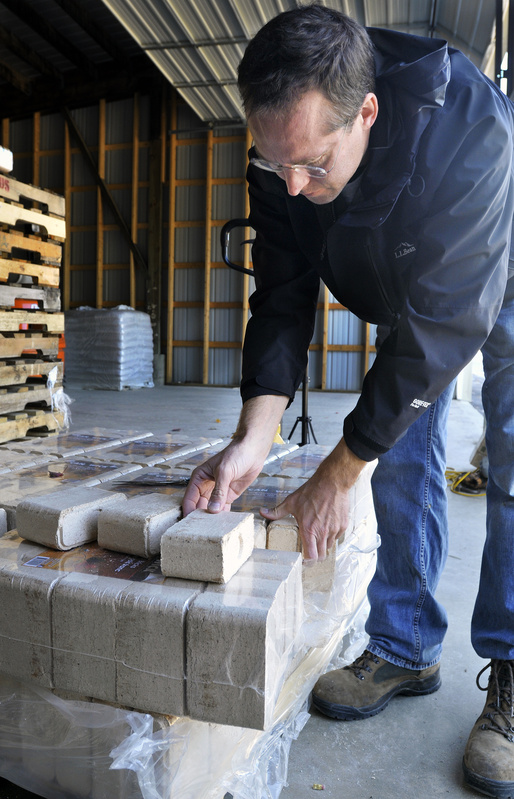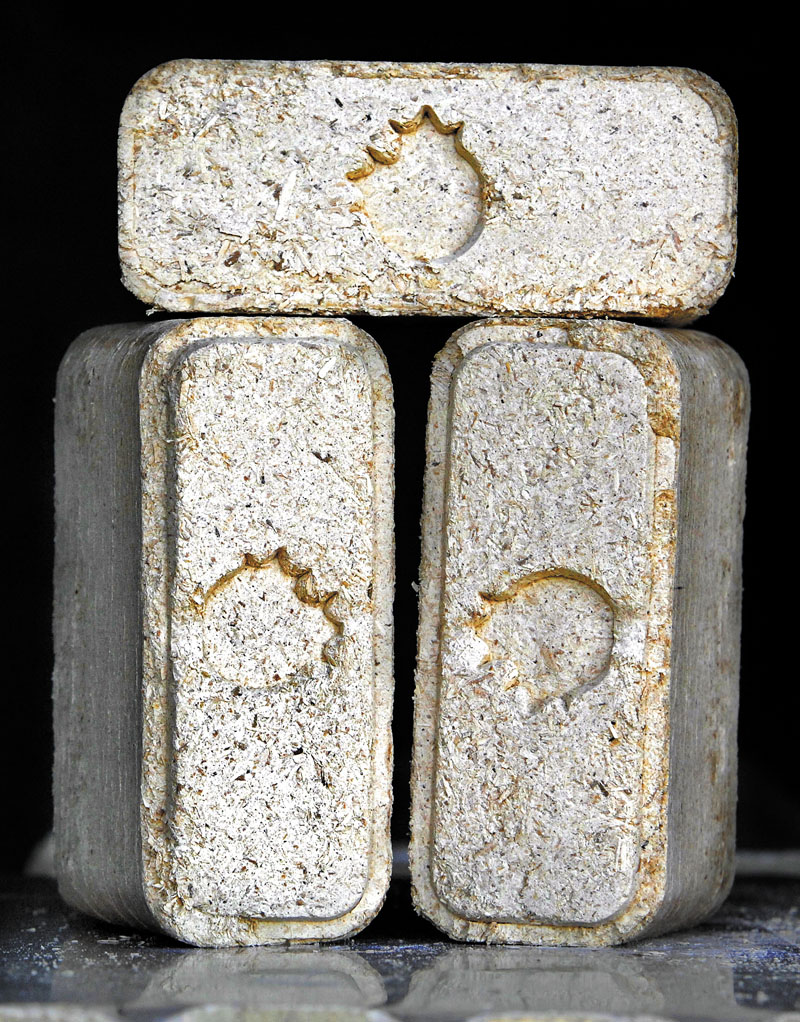BRUNSWICK — Six years ago, Mike Sullivan ordered a few cords of what had been advertised as “seasoned” firewood. It wasn’t. The wood was so green, it barely burned in his stove.
That got him thinking about alternatives.
Today, Sullivan sells Canawick Hardwood Bricks. The 6-inch long blocks are made from pressed hardwood sawdust, dried to a 6 percent moisture content. They burn very hot, with little ash and less air pollution than cordwood. They are imported and distributed in New England by IDW International LLC, of Fort Kent.
Sullivan sold 50 tons during his first year in business. He expects to sell 2,000 tons this heating season. He foresees so much growth, he’s trying to arrange rail service from New Brunswick, where the bricks are produced.
Ninety percent forest, Maine is a place where wood heat has meant cordwood. That’s changing. Wood pellets have been gaining in popularity, but relatively few people have so far bought pellet stoves or boilers.
Many Mainers already own wood stoves and fireplaces, however, and they’re looking for ways to offset high oil prices. That’s creating a market for an expanding variety of pressed-wood bricks and logs designed to compete with traditional, cut-and-split cordwood.
The market potential has caught the attention of Maine’s young wood pellet industry, which is monitoring consumer acceptance as it considers making a pressed-wood brick product.
These bioproducts have some advantages over cordwood. A shrink-wrapped pallet of bricks takes up less space than a cord of wood, without the bark, dirt and insects. The high density and low moisture content also mean more heat energy per pound.
Heat energy is a tricky comparison, though, when it comes to price.
At this time of year, a ton of the Canawick bricks that Sullivan carries can cost up to $280, plus delivery. Seasoned wood in southern Maine is roughly $30 less per cord. But unless the logs are air-dried to a moisture content of 15-20 percent and then stored correctly, they won’t have as much heat energy per pound as bricks.
“It’s just a matter of time and space,” said Bob Maurais, who operates Southern Maine Renewable Fuels in Windham and Wells. “People are tired of processing firewood, and the typical homeowner doesn’t have the time and space to do it.”
Maurais sells Canawick bricks, as well as six other bioproducts. They include EnviBlocks, a hardwood block made in Pennsylvania that can burn up to six hours; BioBricks, a compressed wood brick made in Connecticut; and Cozy Logs, an aromatic, Canadian-made log of compressed cedar.
Consumers can compare prices, burn times and availability on the company’s website: www.woodpellets4me.com.
Maurais also sells wood pellets. He has been moving twice as many tons of pellets as pressed wood.
But pressed-wood sales are growing fast, expected to reach 800 tons this year. Some people burn them exclusively; others mix them with cordwood for additional heat in the coldest weather.
Pressed wood won’t appeal to a homeowner with a woodlot and chain saw. But for city and suburban dwellers who stack and haul delivered cordwood, Maurais suggests sampling different pressed-wood bricks or logs.
“Mainers are smart, and frugal with their time and money,” he said. “Unless you have a woodlot, this is a better deal. And it’s better for the environment.”
The Canawick bricks that Sullivan sells are made from waste sawdust at a large flooring factory in Saint Quentin, New Brunswick. He drove there earlier this month to help design and package a long-burning log that the company plans to sell in New England, perhaps later this year.
Sullivan has 50 tons of Canawick bricks stored in a warehouse here. He and part-time helpers deliver in the area, charging $50 for the first ton outside of Brunswick. He recently was loading a trailer heading to Pownal, with an 1,800-pound pallet that sells for $260.
People also can pick up fuel at the warehouse. Prices drop to $245 a ton in April, when the heating season ends.
“I do a huge volume in spring and early summer,” he said.
As business grows, Sullivan wants to back off retail sales and concentrate on distribution. He currently sells wholesale to retailers including Southern Maine Renewable Fuels and Paris Farmers Union.
Because pressed-wood bricks and logs remain a niche business, most of the fuel is available as a by-product of sawmills and manufacturing plants. That’s how wood pellets started out. But in recent years, the demand for pellets has grown to a point where the fuel now is typically made from tree-length logs that are chipped and fed into giant driers.
Those driers also could prepare wood for bricks and logs at Maine’s four pellet mills, according to George Soffron, chief executive officer of Corinth Wood Pellets.
“It’s a natural extension for pellet manufacturers,” said Soffron, past president of the Maine Pellet Fuels Association.
But market demand still hasn’t reached the point where it justifies buying new driers and compacting equipment at Corinth, he said. That could change, as consumers become more aware of the benefits of pressed-wood bricks and logs.
“I think that in a couple of years we’ll be entering that market,” he said.
Staff writer Tux Turkel can be contacted at 791-6462 or at:
tturkel@pressherald.com
Correction: This story was updated at 5:42 p.m., Oct. 17, 2011, to state that IDW International LLC, of Fort Kent is the New England importer and distributor of Canawick Hardwood Bricks.
Send questions/comments to the editors.





Success. Please wait for the page to reload. If the page does not reload within 5 seconds, please refresh the page.
Enter your email and password to access comments.
Hi, to comment on stories you must . This profile is in addition to your subscription and website login.
Already have a commenting profile? .
Invalid username/password.
Please check your email to confirm and complete your registration.
Only subscribers are eligible to post comments. Please subscribe or login first for digital access. Here’s why.
Use the form below to reset your password. When you've submitted your account email, we will send an email with a reset code.